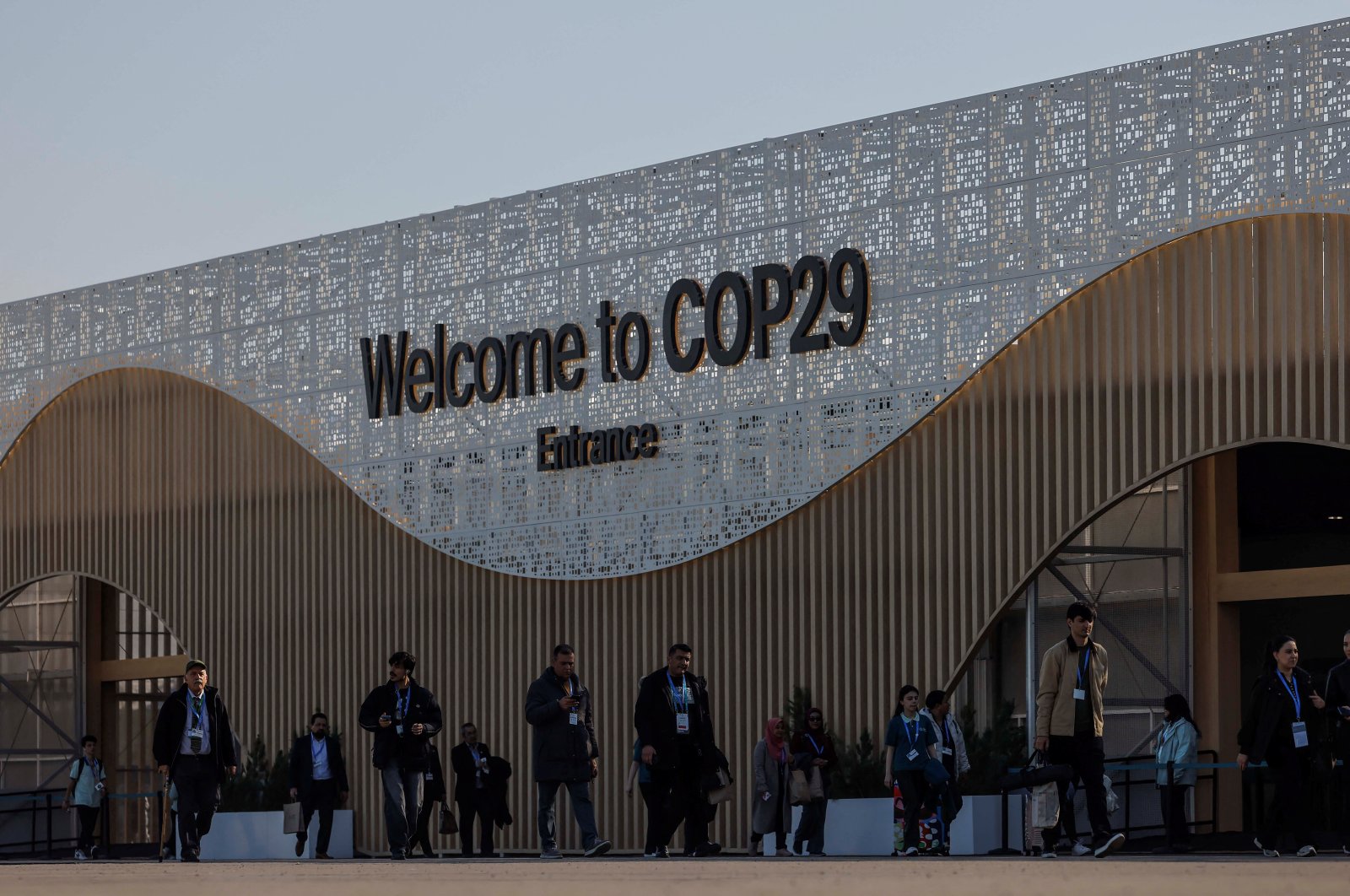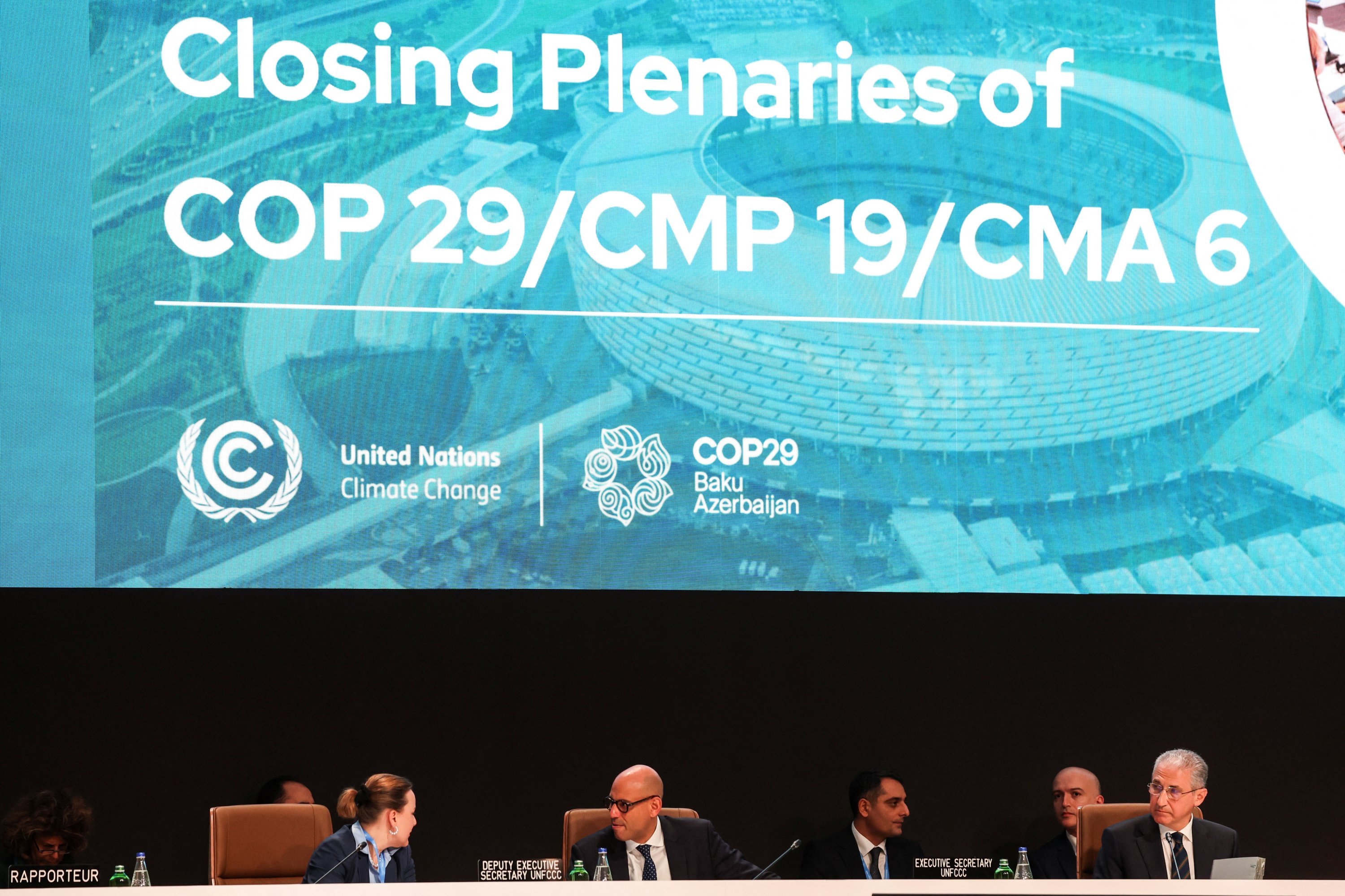
Countries at this year's climate summit in Baku agreed on Sunday to an annual finance target of $300 billion to help poorer countries deal with impacts of climate change, with rich countries leading the payments, according to a hard fought deal clinched in overtime at COP29.
The new goal is intended to replace developed countries' previous commitment to provide $100 billion per year in climate finance for poorer nations by 2020. That goal was met two years late, in 2022, and expires in 2025.
The agreement was criticized by developing nations, who called it insufficient, but United Nations climate chief Simon Steill hailed it as an insurance policy for humanity.
"It has been a difficult journey, but we've delivered a deal," Steill said after the agreement was adopted.
"This deal will keep the clean energy boom growing and protect billions of lives. It will help all countries to share in the huge benefits of bold climate action: more jobs, stronger growth, cheaper and cleaner energy for all."
"But like any insurance policy – it only works – if the premiums are paid in full, and on time."
The COP29 climate conference in the Azerbaijan capital had been due to finish on Friday, but ran into overtime as negotiators from nearly 200 countries struggled to reach consensus on the climate funding plan for the next decade.
At one point delegates from poor and small island nations walked out in frustration over what they called a lack of inclusion, worried that fossil fuel producing countries were seeking to water down aspects of the deal.

Some delegations said this deal is headed in the right direction, with hopes that more money flows in the future. Yet, some like India were not satisfied.
"It's a paltry sum," Indian negotiator Chandni Raina said, repeatedly saying how India objected to rousing cheers. "I'm sorry to say we cannot accept it."
She told The Associated Press (AP) that she has lost faith in the United Nations system.
A long line of nations agreed with India and piled on, with Nigeria's Nkiruka Maduekwe, CEO of the National Council on Climate Change, calling the deal an insult and a joke.
"I'm disappointed. It's definitely below the benchmark that we have been fighting for for so long," said Juan Carlos Monterrey, of the Panama delegation.
He noted that a few changes, including the inclusion of the words "at least" before the number $300 billion and an opportunity for revision by 2030, helped push them to the finish line.
The summit cut to the heart of the debate over financial responsibility of industrialized countries – whose historic use of fossil fuels have caused the bulk of greenhouse gas emissions – to compensate others for worsening damage wrought by climate change.
It also laid bare divisions between wealthy governments constrained by tight domestic budgets and developing nations reeling from costs of storms, floods and droughts.
Speaking for nearly 50 of the poorest nations of the world, Evans Davie Njewa of Malawi was more mild, expressing what he called reservations with the deal.
And the Alliance of Small Island States' Cedric Schuster said he had more hope "that the process would protect the interests of the most vulnerable" but nevertheless expressed tempered support for the deal.
'A base on which to build'
U.N. Secretary-General Antonio Guterres said in a post on X that he hoped for a "more ambitious outcome." But he said the agreement "provides a base on which to build."
There were somewhat satisfied parties, with European Union's Wopke Hoekstra calling it a new era of climate funding, working hard to help the most vulnerable. But activists in the plenary hall could be heard coughing over Hoekstra's speech in an attempt to disrupt it.
Countries also agreed Saturday evening on rules for a global market to buy and sell carbon credits that proponents say could mobilize billions more dollars into new projects to help fight global warming, from reforestation to deployment of clean energy technologies.
Countries are seeking financing to deliver on the Paris Agreement goal of limiting global temperature rise to 1.5 degrees Celsius (2.7 degrees Fahrenheit) above pre-industrial levels – beyond which catastrophic climate impacts could occur.
The world is currently on track for as much as 3.1 degrees Celsius of warming by the end of this century, according to the 2024 U.N. Emissions Gap report, with global greenhouse gas emissions and fossil fuels use continuing to rise.
What counts as developed nation?
The roster of countries required to contribute – about two dozen industrialized countries, including the U.S., European nations and Canada – dates back to a list decided during U.N. climate talks in 1992.
European governments have demanded others join them in paying in, including China, the world's second-biggest economy, and oil-rich Gulf states. The deal encourages developing countries to make contributions, but does not require them.
The agreement also includes a broader goal of raising $1.3 trillion in climate finance annually by 2035 – which would include funding from all public and private sources and which economists say matches the sum needed to address global warming.
Securing the deal was a challenge from the start.
Donald Trump's U.S. presidential election victory this month has raised doubts among some negotiators that the world's largest economy would pay into any climate finance goal agreed in Baku.
Trump, a Republican who takes office in January, has called climate change a hoax and promised to again remove the U.S. from international climate cooperation.
Western governments have seen global warming slip down the list of national priorities amid surging geopolitical tensions, including Russia’s war in Ukraine and expanding conflict in the Middle East, and rising inflation.
The showdown over financing for developing countries comes in a year that scientists say is destined to be the hottest on record.
Climate woes are stacking up in the wake of such extreme heat, with widespread flooding killing thousands across Africa, deadly landslides burying villages in Asia, and drought in South America shrinking rivers.
Developed countries have not been spared. Torrential rain triggered floods in Valencia, Spain, last month that left more than 200 dead, and the U.S. so far this year has registered 24 billion-dollar disasters – just four fewer than last year.
